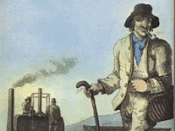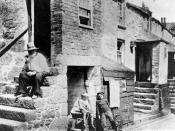Leisure at the turn of the century faced a social battle between a Victorian "cult of domesticity" and a fierce passion for sexual endeavors. This is the clash illustrated by Kathy Peiss in "Cheap Amusements", as well as in "An Hour before Daylight" captured by Jimmy Carter. Politics, society, and economy set the mood for interests in leisure, the nature of leisure, and therefore the leisure activities themselves. Even though Peiss describes leisure of single working-class females, while Carter's novel surrounds the family, they both share an abiding interest in leisure.
Carter's influence from political, social, and economic genres would shape his views on leisure. His time was continually centered on the farm and family. This is a function of geography, and also a function of living during the Depression. The South was economically supported by agriculture (cotton and corn.) The Depression affected everyone, and government policy to help ultimately failed leaving them devastated.
"1933 more than 5% of the nation's farms underwent mortgage because of delinquency." The loss in profits also had negative health ramifications. Disease and malnutrition would be on the minds of all parents during the depression. "In 1933 more than 300,000 children were out of school," which meant the parents who were already tired from all-day labor had to care for as many as 6-8 sick children. In this way, Carter's family would not represent the majority of Southern farmers during the time of economic crisis. His family would enjoy luxuries like electricity, clean water, clean bathrooms, and parents with good jobs. The government tried to help farmers out of poverty, but Carter writes that many of the government aids ironically encircled the tenement farm owners, and the powerful wealthy who could find gaps in the policy to use to their advantage. This period would...


